Four Royal Air Force Typhoon FGR4s, supported by two Voyager tankers, again participated in a coalition strike against Houthi military facilities in Yemen which had been conducting missile and drone attacks on commercial shipping and coalition naval forces in the Bab al Mandab, southern Red Sea, and Gulf of Aden.
The RAF aircraft were allocated multiple targets located at two sites.
Intelligence analysis had successfully identified several very long-range drones, used by the Houthis for both reconnaissance and attack missions, at a former surface-to-air missile battery site several miles north-east of Sanaa.
According to a statement:
“Our aircraft used Paveway IV precision guided bombs against the drones and their launchers, notwithstanding the Houthis’ use of the old missile battery revetments to try to protect the drones.
Previous RAF strikes, on 11 January and 3 February, had already successfully destroyed a number of buildings used to support drone and cruise missile operations at Bani, some fifteen miles west of Abbs airfield in north-western Yemen. Additional buildings at the Bani site had subsequently been confirmed as also being involved in the drone and missile activities there and were therefore targeted during this latest strike.
In planning the strikes, as is normal practice with such RAF operations, the greatest possible care was taken to minimise any risk of civilian casualties.”


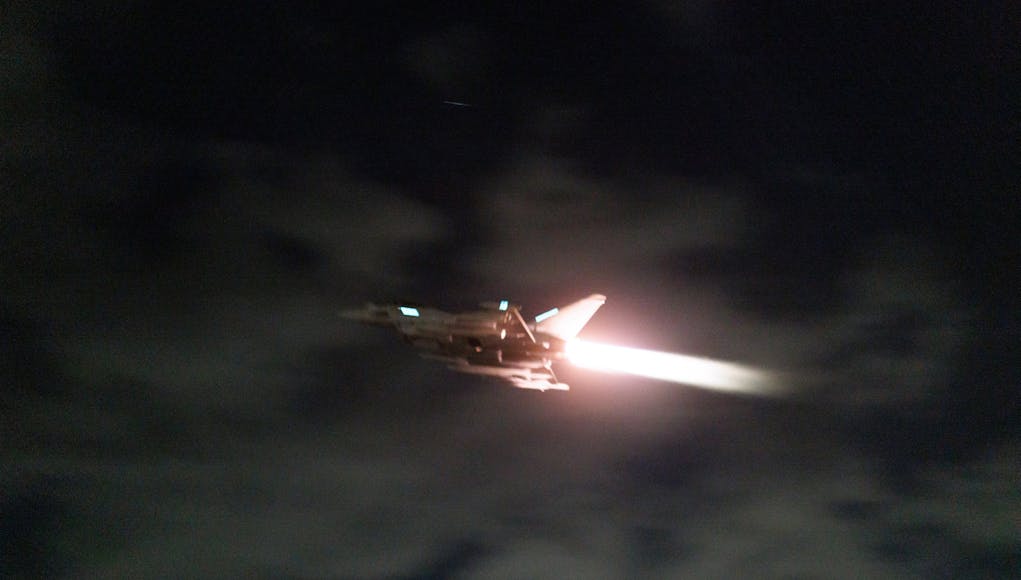
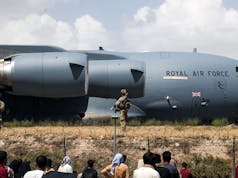
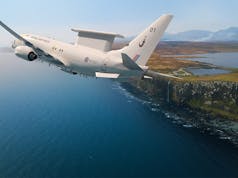

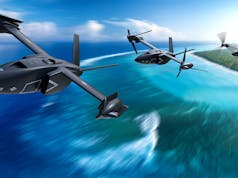
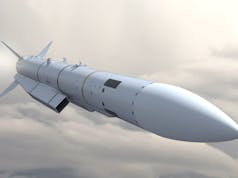
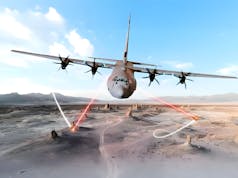





It’s getting time for us to look at ground forces, can’t let a bunch of terrorists shut down world commerce. Ultimately this is what we have a military for.
But we actually don’t have that much military left anymore Jim. What we do have should Be held to check Russian adventurism.
I don’t think there is any political or widespread public support for going into Yemen on the ground and becoming embroiled in another middle eastern conflict in that manner.
If we can keep a lid on the Houthi threat by naval blockade. Preventing supplies and hardware arriving in Yemen from Iran and intercepting cruise, ballistic and UAVs fired against shipping then that is fine.
The air strikes will be hurting the Houthis. We just need to keep them up.
Enduring overwatch is needed, so long endurance protector type drones.
The only piece of Yemeni territory I’d recommend taking is the island in the middle of the channel between Yemen and Ethiopia/ Somalia.
It could be fortified, guarded and house fixed battery Aster 30s or land Ceptor as well as flights of Protector/ reaper drones there are 2 partial constructed airfields on the island, to ensure the required enduring overwatch of the Houthis and keeping the threat bottled up… indefinitely.
We got nearly 100,000 soldiers not deployed. Plus by we I don’t mean the UK solo.
Where do you get those figures from Jim? The Army is about 72,000 total. Just for reference, when the Army was 102,000 the field Army was about 56,000.
Then you have to factor in what was known as form cycle – as a rule of thumb in HERRICK days, we had about 1/4 of the total force deployed, 1/4 training, 1/4 recovering and a 1/4 on high readiness (very roughly). You can’t just deploy “The Army”.
Finally, probably the worst course of action now would be to escalate with ground forces. The best use of ground forces if used at all would be surgical raiding to destroy infrastructure which would send a powerful message. But if you can achieve the same operational result with an air strike at monumentally lower risk – why not do that?
The last point is key. This isn’t a nation state, this is insurgents. We and the US did such a great job in afgan and Iraq (lessons have to be learnt from them that ground forces cant beat insurgents, also look at ussr in afgan or us in somalia). They are using highly mobile tech which means convention strikes and raids just won’t achieve much other than reassuring the public that something is being done and giving the insurgents more motivation.
I honestly think an economic solution is a better one. Better to help build up the yeman economy so that the people stop backing the insurgents. Its always the case that it’s only the very poor and downtrodden that want to fight, middle classes just want to get on with their lives. However that is long term solution to all of the issues, politicians prefer short term ones.
British land forces, includes RM, joint helicopter, RAF regiment etc.
Right Jim, so there are about 3000 RMs, and about 1800. So you can add ~5000.
But then, the RM only have 2 actual manoeuvre units – roughly 1200. The rest are specialists and boarding teams.
1800 RAF Regt should have read.
Royal Marine strength in October last year was 6500. It has been dropping steadily by around 1%. There are four active Commando units. Three 40, 42, 45 are similar in orbat to an army battlion. They make up the teeth or front line troop element of 3 Commando Brigade. The brigade fully deployed should have a strength of around 3500 subject to what level they deploy. So logistic support, Artillery, Engineer tend to be adjusted as required. Like all military units they are short on manpower.
You figures are wrong on RM numbers.
The army is not 72k. It was 76k in October plus 4k Gurkhas. Then there’s 6k RM and maybe 2k RAF reg, 26.5k army reserve, and 1k RAF and RM reserve.
So 88k regular and 27.5k reserve ground forces.
The CHF and RAF helicopter force could also be added but I’ve no idea how large they are.
I stand corrected Louis. However, Gurkhas are part of the full time strength, not in addition.
Trade trained = deployable and that sits below 76,000.
Reserve forces (except high readiness reserve) sit at 365 notice to move and aren’t generally counted in the deployable strength. Officially the Volunteer Reserve are a second echelon force, although over HERRICK they were used as augmentation – Post A2020 Refine, we all realised that formalising that was untenable so regular units were reduced in number and brought up to full strength.
3 Cdo Bde can’t deploy as a manoeuvre Bde in the true sense because 42 Cdo provide standing commitments to maritime operations.
The RAF Regt is not committed to UK land forces as it’s a FP force deployed by Air Command.
Then we go back to my first comment – you don’t deploy the entirety of land forces, it’s not how it works. Even in an all out war, we maintain a Strategic Reserve and Operational Reserve. At every level we try to maintain a 1/3 of the force as a minimum as a reserve so that we can rotate.
So the relevance of talking total numbers is really about calculating your maximum deployed force, not how many people you could put on the ground if you sent everyone. The original poster seems to think that we have 100,000 soldiers not deployed. Well, that’s simply not the case.
If you actually looked, we’ve probably got about 3 BGs at 30days NTM with some Bde HQ elements across the whole of land forces. That’s people trained and equipped ready to deploy.
We’ve got units already deployed on tasks that we can’t just stop.
Gurkhas are not counted in the overall army strength. They are counted separately and listed as such in the MOD statistics.
The most recent is the October 2023 statistics (can’t find the January 2024 for some reason).
Army is at 111,170. 75,980 regular, 26,540 reserve, 4,100 Gurkhas and 4,550 other (maybe soldiers in phase 2 training).
We don’t need to have them at 30 days readiness. Buildups for both Iraq wars were measured in months not days.
The Falklands is the only real exception to that, but it shows that in a real emergency, units not on high readiness (the Guards battalions) can deploy much faster than otherwise. Obviously for Iraq or this fantasy Yemen invasion that isn’t applicable.
We wouldn’t be doing it alone either. It would have to be with the US, and the Saudis would probably join as well.
We can also definitely stop peacetime tasks. AMF (L) was disbanded because we pulled our troops out of it to prepare for Iraq and the brigade couldn’t function without those tasks. The Estonia battlegroup could be pulled out. It isn’t as if the whole of Europe can’t surge 1 battlegroup for however long. Same for the Gurkhas.
Of course the total force can’t be deployed, even at 10 years notice, but we wouldn’t need to. 32k ground forces were deployed to Iraq 2003 from a force of 110k Army, ~3.5k Gurkhas and 6.5k RM, and a TA of 38k. With overall land forces roughly 70% of the size, we should be able to deploy 23k land forces in 10 weeks, with planning beforehand. It will be less than that because percentage of non deployable troops will have increased, but still probably 20k+.
I am well aware that other than maybe some SAS and Delta, the US and UK won’t deploy troops on the ground in Yemen.
https://www.gov.uk/government/statistics/quarterly-service-personnel-statistics-2022/quarterly-service-personnel-statistics-1-july-2022#introduction
Sorry to be a pedant, but Ghurkas are indeed counted under Trade Trained strength in the official reporting on numbers.
What I find interesting is how very small our reserve forces are…it’s the same model with France and Germany, very small reservist forces.
Doing exercises to demonstrate capabilities and forward presence to demonstrate determination to resist invasion for deterrence.
In other words showing readiness to defend the alliance against aggressive adventures. That’s most of what can be done short of physical war.
In the cyber domain we have been at war for years. Bits on the ground, not boots on the ground.
The problem is just that the UK as is the case with most NATO countries they are simply not capable of defeating any aggressors by themselves. That’s one problem we have is that we’re not capable of defending our selves without help which is definitely not good.
“I don’t think there is any political or widespread public support for going into Yemen on the ground and becoming embroiled in another middle eastern conflict”
Because that would be following kaputins narrative of aggressive NATO and distraction from Supporting Ukraine, definitely not.
Showing kaputin that irrelevant little UK is capable of walking and chewing gum at the same time is sufficient.
RAF RC-135W Rivet Joint ISTAR missions, C-17 supply missions, and these Typhoon/Voyager missions can all continue simultaneously to impact ruzzian empire adventurism.
If the Crimlin doesn’t like it they can bring their orcs back to mordor.
Big difference is Yemen actually matters, Afghanistan never did. We can’t afford for the Red Sea to be permanently blocked. Afghanistan geography means it will always be a failed state. Yemen is very different.
Also in open combat with US forces the Taliban that was lasted 5 minutes. We don’t need to go in and nation build we need to take their ballistic and cruise missiles of them.
It’s a radically different situation to Afghanistan.
Agree, and we can do both strategic Support to Ukraine and Yemen freedom of navigation at the same time.
Is it the geography of Afghan that makes it a failed state or the people & beliefs…
The British doctrine is very different. We’ve rarely if ever had a majority over our enemies.
It’s not the size of the armed forces in this case, its disparity in rules of engagement. If the gloves were off and modern decency didn’t come into play, a fairly small deployment could easily win, but that would never happen. Once the gloves are on and you have US losing in Vietnam, us losing in somolia or uk/us losing in afgan/iraq. It’s not a fair fight when if comes to insurgents.
Apart from SF operations, we should never again put boots on the ground in the Arabian peninsula.
The UK withdrew from Aden in the early 1970’s as it was descending into an insurgency situation, it was the right move.
Put troops on the ground in Yemen and it will simply turn into Afghanistan chapter 2.
As others have said, best we can do is keep their heads down, limit the damage to international shipping and perhaps turn on the support taps to the government forces in the Yemen, to help defeat the insurgency from within.
I think the time has come to really turn the pressure up with Iran, use our intelligence services to fund destabilising groups within Iranian and deniable surgical strikes on key regime/ military/ industrial nodes.
Play them at their own game, they always deny everything, so if an Iranian government facility suddenly ends up as a smoking hole in the ground, we just shrug our shoulders too and say nothing to do with us mate…..
Time to fight fire with fire. If you can bring the Iranians to heel, then all there’s crackpot islamic terror groups will slowly wither on the vine.
Yes I’m advocating a raiding strategy not an occupation, Very much like the early actions against the Taliban. Also important to see who else we can work with on the ground. We not trying to stop people with IED’s but very sophisticated anti ship missiles and ballistic missiles. These things are massive and not easy to hide.
I am sure US and UK SF would love a crack at the Houthi missile batteries. Launch from Saudi Arabia?
No need to involve the Saudis or Oman just go in for the coast. Between the US and the UK we have plenty naval assets. Aircraft can come in from carriers, Cyprus and Diego Garcia using international air routes or Israel air space.
Massively easier than operations over Afghanistan.
Jim,
We are already hitting the Houthis from the coast – US jets from their carrier and Typhoons from Cyprus. My suggestion was SF on the ground in counterpoint to a suggestion of massive numbers of ‘boots on the ground’ going in.
We had no problem conducting air operations (Offensive Air Support or Air Transport] over Afghanistan – I was at Camp Bastion – we had a formidable array of aircraft at Bastion airfield (including USMC Harriers, British Apaches, British Chinooks etc) and many more air assets at Kandahar Airfield – why do you think we had a problem?
The problem was getting men and equipment in at the start, the US had to do a fair amount of begging with neighbouring countries.
Logistics got better over time but it was still massively difficult and expensive trucking all those supplies in through Pakistan.
Pakistan closed the road more than once as well and had to be paid a lot to keep it open.
Jim, you are now talking about setting up the ISAF operation in Afghan well over 20 years ago?
Weren’t we talking about hitting the Houthis in 2024?
I was replying to previous comment
As I’ve mentioned in previous posts, hit the source (Iran) hard and destroy their munitions and drone factories which will go a very long way to helping Ukraine in the process.
Not sure 4 Typhoons would have much of an impact though mate….. Iran is HUGE and a very long way away….. we are simply not capable of Shutting them down…. I doubt even a Coalition would succeed now either …….
It would take a US-led Coalition to do it without question.
Sadly, when push comes to shove we shy away which isn’t exactly a good look.
I’m sure China is looking on, which is another very good reason to show some real strength before they see it as a weakness.
China is playing this game way better than us mate…..
Yes, Xi Jin Ping and his 4 D chess skills have seen Chinese freight rates more than double at a time when China is in a steep recession and desperately needs exports to stay afloat.
They playing the “game ” really well 😀
Although on the flip side, china would just love the west to be engaged and tied down in a major war in the Middle East…it may just trigger china to decide it’s the best time to invade Taiwan.
Its difficult all round unfortunately..to do the job properly would take vast resources that would include a reasonably significant percentage of the USNs available carrier battle groups….which would weaken any response in the western pacific….to not do it with significant resources could lead to failing…which would be catastrophic….but to not do anything looks weak…..the west is backing itself into a very bad place with some questions that are starting to look like they have no good answer.
A few hundred well-placed Tomahawks would make a very severe dent in their arsenal without much risk and a warning of more to follow.
A few hundred well-placed Tomahawks would make a severe dent in the arsenal of whoever fired them!
The risk is that Iran responds by closing the straights of Hormuz.
Frank62 wrote:
There is always that risk, and it is a premise the Mullahs in Tehran love to promote. But the underlining fact very few bother to mention is Iran is skint. It depends 100% on the revenue from the sale of hydrocarbons to keep the lights on. The problem there is for Iran is that due to the low price of crude these past few years and the reduction in people willing to purchase from it means its bank balance is in the red and has been for a few years.(things aren’t helped by Moscow undercutting it regards the sale of crude to the likes of India and China, Irans traditional largest markets) There lies the main reason why it has been directing its Houthi proxy to hinder shipping traversing the Red Sea, not because of Israel, but because by default it increases the piece of crude, resulting in Iran cashing in. Yes Iran could close the straits of Hormuz, but in doing do it would deprive itself of its main money maker which is what the Mullahs require in which to starve off public dissent at home, of which there has been a steady rise of these past few years, which has resulted in the mullahs having to use force in which to remain in power.
The Mullahs understand only too well, that their entire position is based on a house of cards and if push comes to shove, then everything they have built will come tumbling down and the problem for the Shia Islam mullahs is they have nowhere in the world to run to, other than the Uk that is.
Good point Farouk, I’d not considered how it would stop Iran’s own oil trade.
Most of the oil going through the straits is Iranian, the Saudis pump a lot on to the Red Sea coast for export.
We could just hit Irans spy/supply ships in th Red Sea.
As well as. If you’re going to do a job…..
I feel much the same Nigel. The very big “BUT” though is that it would shut down the Gulf tranker trade for the duration. They have a strangle hold on that & it would be extremely damaging to all our gulf allies.
Maybe we’re approaching a showdown time for Russia-China-Iran-N Korea though. That needs wise, mature, capable leadership which seems the polar opposite to what we see in power or on offer today.
I see your point, Frank. It is fairly well known that Middle Eastern countries understand two things. 1. strength and 2. weakness. Strength will earn you respect, weakness will invite aggression which is why the Houties are continuing on with their current operations in the gulf.
Slap someone and expect some form of retaliation, hit them hard and they think twice about having another go.
An old East End proverb I learnt growing up there!
Would be interesting to know what they are actually striking, as so even after hundreds of strikes by the US and a dozen by the UK, the attacks on shipping seem to be increasing rather than decreasing.
Well every time we’ve bombed the Middle East in the last 40 years it has made things worse so why would this time be any different?
That does seem to be the case. Leassons don’t get learnt.
For better or worse the general public of the US and lessor extent, but still the case, uk would never agree to a real political/economic solution. Too many people obsessed with the idea that it’s democracy or the highway, and so focus on regime change, which whilst ideal is way too ideological and simplistic to be the right or real solution most of the time.
cant we round up thousands of skunks and drop them, at the very least they may pong them out of the mountains, or infected rats ? ,,just thinking out of the box. something has to be done to stop these bad guys, or punish Iran ? just saying like..
Another good effort by the RAF, a drop in the ocean in regards to targets hit, but a good show of commitment and good operational experience for the RAF aircrew.
On the face of it, the Houthis ability to launch strikes on shipping appears not to have been diminished at all!
This is why it would be good if the media actually did their job and asked for details of what was hit and why. Iraq1 we had all that info daily on the news but ever since it’s been hidden under national scrutiny bs and / or lazy journalism.
I guess if they are hitting stockpiles of missiles then in the short term it won’t impact anything but overtime it will reduce the ability to sustain the attacks. We just don’t know they could just be dropping the bombs in the ocean for all we know.